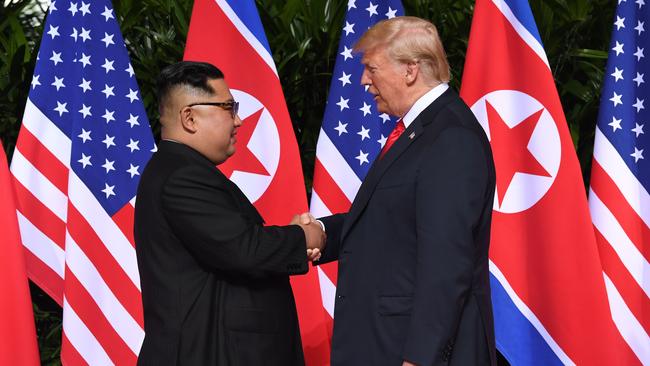
Both leaders set huge store by effect, by looking tough, by being the centre of events. That is not to equate them, of course.
Trump is unconventional but he is a perfectly legitimate, democratically elected leader of the world’s most powerful nation.
Kim is the most murderous, brutal and totalitarian dictator, sitting atop a ramshackle, impoverished kingdom chiefly important internationally because it has an unknown number of nuclear weapons. There is some chance — not much — that North Korea will get rid of all of its nuclear weapons. It might say it will, but in reality I think I have a better chance of winning the US Ladies Professional Golf Championship than Pyongyang has of getting rid of its nukes.
However, the summit could still yield some benefits. There are also two dangers. One is very big; one is moderate.
The big danger is that Trump makes a deal that involves a real concession from the US and in return gets a commitment to progressive denuclearisation from North Korea, which ends up being a chimera.
Of course, given Trump’s ability to change his mind and change his position, any concession he gives he can easily take back. Except that if he weakens the US security alliance structure in Northeast Asia, it would perhaps be beyond his power to reverse.
This could happen if he agrees to anything that undermines the US-South Korea alliance. That would not only be disastrous in itself, it would have knock-on effects with other US allies such as Japan and further afield.
One obvious road in that direction would be to agree to Kim keeping his nukes for a long time in exchange for giving up his intercontinental ballistic missiles.
That would protect America but leave Japan, South Korea and other US allies exposed, although of course it would also be impossible to verify the proposition that Kim had truly given up his ICBMs.
Even more disastrous, though surely less likely, would be Trump agreeing to a reduction in US troop numbers in South Korea.
The smaller danger is that Trump gets a symbolic victory and begins a dialogue with Kim and that’s more or less as far as things go. In that case Kim has got past the period when the US was credibly threatening a military strike and has given nothing in return. At the same time Kim has secured some relaxation of sanctions.
Initially Trump said the US would continue to apply “maximum pressure” on North Korea unless Kim agreed to complete, verifiable and irreversible denuclearisation. Even if Trump decides to maintain sanctions, the Chinese have effectively started to reduce them already, resuming regular Pyongyang-Beijing flights and the like.
And far from the pariah he was a few months ago, Kim is now a world statesman, receiving distinguished international visitors, and paying great visits of state. Trump even says he will invite Kim to the US.
For all that, Trump is right to push this summit process and see if he can get a good result. He has changed the dynamics of the situation. That is promising. On the other hand, it is a very bad signal that he tells us he doesn’t need to prepare for the summit, that he will know whether it’s working in the first minute.
That, as usual, casts Trump as the centre of his own psychodrama. It doesn’t fill you with confidence that a sustainable deal is on the cards.
Similarly, that the Trump White House embarked on an almost surreal attack of wild vitriol on Canadian Prime Minister Justin Trudeau is also damaging. Canada is a close US ally. Alliances involve long-run national commitments, beyond a president’s personality.
And one essential ingredient of peace and security in Northeast Asia is everybody believing in US commitments.







This is a showbiz summit in Singapore with the two biggest stars in international politics, Donald Trump and Kim Jong-un, each pursuing an outcome that satisfies their respective senses of theatre.